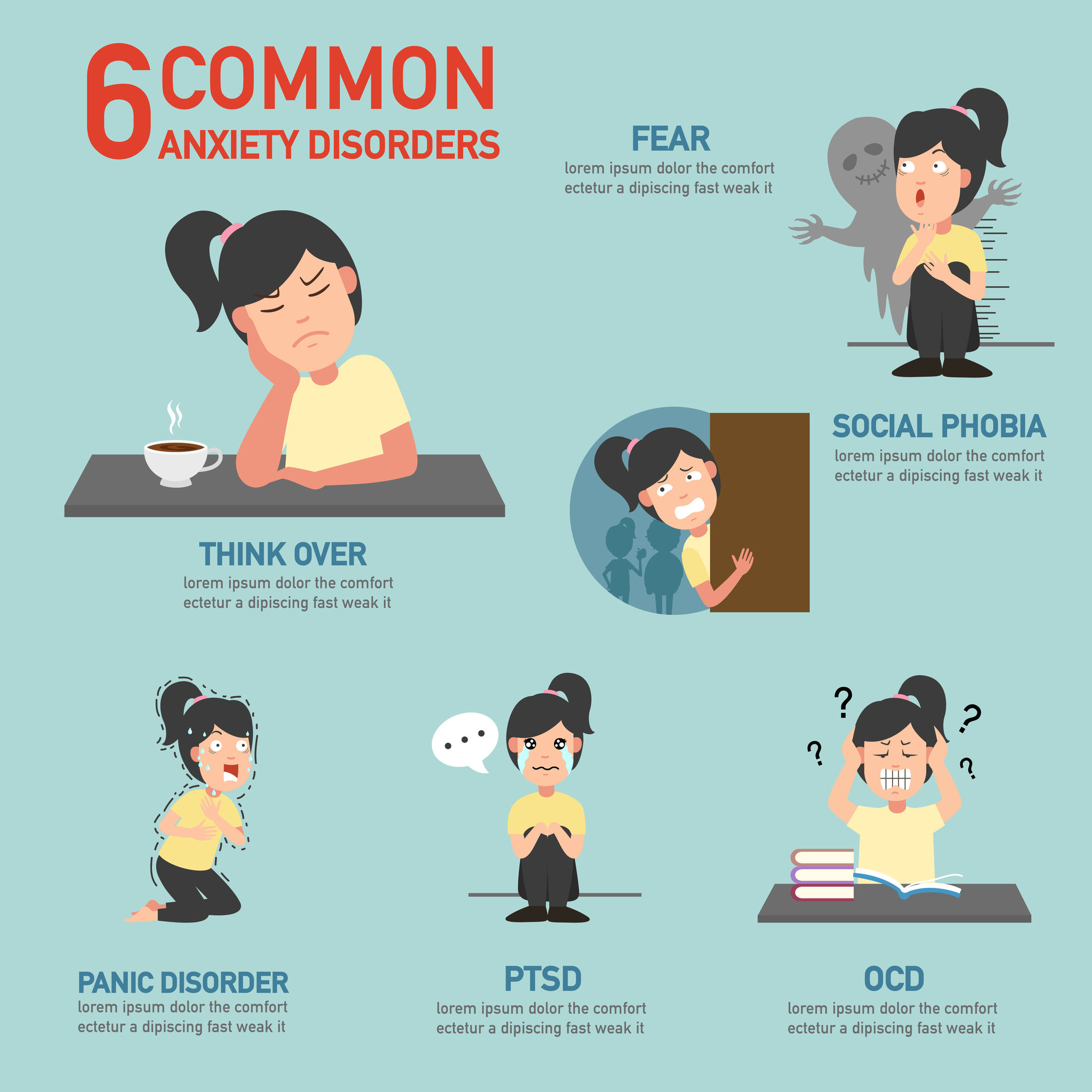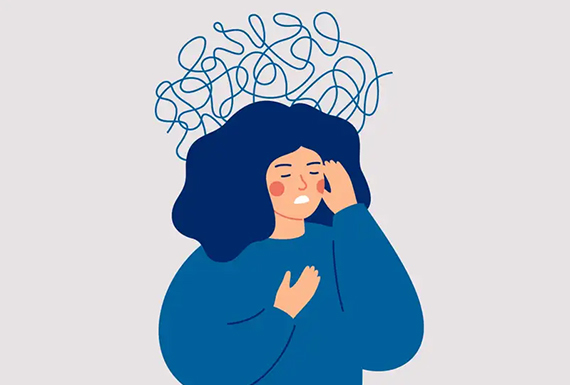Online support accessible today with a licensed therapist for anxiety
Online support accessible today with a licensed therapist for anxiety
Blog Article
Checking Out Various Approaches in Counselling for Stress And Anxiety Condition for Enduring Adjustment
When taking on anxiousness problems, it's vital to discover a selection of counseling strategies. Each method uses unique understandings and devices to help you handle your signs and symptoms effectively. You might find that integrating strategies can generate the most effective results. Recognizing the subtleties of these strategies is vital to cultivating enduring modification. What if the best mix could release a brand-new level of psychological wellness for you?
Recognizing Anxiousness Conditions: A Brief Summary
Anxiety problems, which impact millions of individuals worldwide, can substantially influence every day life. You could experience overwhelming feelings of worry or stress that appear unmanageable. These feelings can bring about physical signs and symptoms like an auto racing heart, sweating, or perhaps dizziness. Usual kinds of stress and anxiety conditions include generalized anxiety disorder, panic disorder, and social stress and anxiety disorder. Each has one-of-a-kind indications, yet they all share a propensity to disrupt your regular and relationships.Understanding the root creates of your anxiety is essential. It may stem from genes, brain chemistry, or life experiences. Recognizing your triggers can aid you handle your actions better. It is essential to bear in mind that you're not the only one in this battle. Many individuals face similar challenges, and seeking help is a solid action towards feeling much better. By discovering about anxiousness disorders, you're already on the path to understanding and handling your problem much more properly.
Cognitive-Behavioral Therapy: Challenging Negative Thought Patterns
In Cognitive-Behavioral Treatment, you'll begin by identifying the unfavorable thought causes that add to your anxiousness. When you acknowledge these thoughts, you'll function on changing them with even more positive choices. Together, you'll construct reliable coping techniques to help handle your stress and anxiety in everyday situations.
Determining Unfavorable Thought Triggers

When you run into minutes of distress, recognizing the certain triggers behind your unfavorable thoughts can be important in handling anxiety. Beginning by taking notice of situations that provoke sensations of concern or fear. Is it a jampacked space, an upcoming deadline, or a conversation with particular individuals? Take down these instances in a journal. This will aid you identify patterns in your thinking. Additionally, notification physical feelings that accompany your adverse ideas, like an auto racing heart or tightness in your breast. By determining these triggers, you get understanding right into what's sustaining your anxiousness. Understanding these connections is the primary step in testing those thoughts and inevitably reclaiming control over your psychological feedbacks.
Changing Ideas With Positives
Challenging negative idea patterns is an essential action in transforming your attitude and lowering anxiety. You might typically discover on your own trapped in cycles of insecurity or catastrophic thinking. Instead of letting these thoughts determine your sensations, practice replacing them with realistic options or favorable affirmations. When you think, "I can not manage this," move it to, "I can handle obstacles one step at a time." This straightforward adjustment can substantially affect your emotion. On a regular basis recognizing and responding to these adverse thoughts helps produce a much healthier interior dialogue. Bear in mind, it requires time and initiative, however constantly exercising this strategy can bring about long-term modification, encouraging you to encounter stress and anxiety with restored self-confidence and durability.
Building Coping Strategies With Each Other
Changing adverse ideas is just the beginning of handling stress and anxiety efficiently. To create long-term adjustment, you require to develop coping strategies that equip you. Cognitive-Behavioral Treatment (CBT) helps you identify and test those unhelpful thought patterns. With each other, you and your therapist can discover just how these thoughts effect your feelings and behaviors.Start by establishing practical methods, like journaling or mindfulness workouts, that permit you to confront anxiousness head-on. When you face your anxieties gradually, you'll find out to respond in different ways.

Mindfulness and Acceptance-Based Approaches: Cultivating Present-Moment Awareness
As you navigate the complexities of stress and anxiety, incorporating mindfulness and acceptance-based techniques can significantly boost your capability to cultivate present-moment awareness. By concentrating on the here and currently, you'll locate that you can observe your thoughts and sensations without judgment (Counseling services for anxiety). This method assists you acknowledge your anxiety without really feeling overwhelmed by it.Engaging in mindfulness exercises, such as deep breathing, body scans, or guided meditations, permits you to ground on your own in your existing experience. Acceptance-based strategies urge you to embrace your feelings rather than combat versus them. They shed their power over you.Incorporating these methods right into your daily routine can change how you respond to stress and anxiety when you approve your sensations. You'll develop strength and find out to browse difficult scenarios with greater simplicity. Ultimately, growing present-moment awareness lays the structure for long-term adjustment, encouraging you to lead an extra meeting life
Exposure Treatment: Challenging Anxieties Gradually
Exposure therapy helps you face your concerns in a gradual means, making it much less frustrating. You'll find out methods to encounter anxiety-provoking circumstances detailed, while likewise developing coping methods to handle your reactions. This technique encourages you to take control and reduce anxiousness in time.
Gradual Direct Exposure Methods

When dealing with anxiety, gradually facing your worries can be an effective means to regain control. This method, referred to as progressive direct exposure, involves slowly exposing on your own to the scenarios or things that cause your anxiety. Begin with less challenging circumstances and gradually work your means approximately even more challenging ones. For instance, if you hesitate of public talking, you could begin by talking before a mirror, after that progress to sharing thoughts with a close friend, and eventually deal with a small team. Each action helps desensitize you to the anxiety, constructing your self-confidence in time. Remember, it's necessary to rate yourself and celebrate small triumphes as you relocate through this procedure, enhancing your ability to manage anxiety efficiently.
Structure Coping Methods
Building efficient coping methods is important for managing anxiousness, specifically as you confront your worries slowly - Counseling services for anxiety. One effective approach is exposure therapy, where you start by facing your fears in a regulated manner. Start with less daunting scenarios and gradually function your means up to even more challenging scenarios. This progressive direct exposure aids desensitize you to anxiety activates, making them less overwhelming.Incorporate leisure methods, such as deep breathing or mindfulness, to soothe your mind throughout direct exposure. Track your progress, celebrating tiny triumphes in the process to enhance your self-confidence. Keep in mind, it's all right to take your time; the objective isn't perfection yet consistent improvement. By developing these techniques, you'll encourage yourself to browse anxiety and welcome life much more completely
Psychodynamic Treatment: Discovering Origin of Anxiousness
Psychodynamic treatment checks out the subconscious mind, exposing the origin triggers of your anxiousness. By analyzing your thoughts, feelings, and past experiences, this strategy helps you uncover underlying problems and unresolved issues that may add to your present anxiousness. You'll collaborate with a therapist to examine childhood years experiences, relationships, and psychological patterns that shape your feedbacks today.As you get understanding into these deeper layers of your mind, you'll begin to acknowledge just how previous occasions affect your present behavior. This understanding can lead to catharsis, allowing you to refine emotions you might have suppressed.Through the restorative partnership, you can likewise identify defense reaction that might have developed with time, supplying a clearer path to change. Ultimately, psychodynamic therapy equips you with the devices to address your anxiousness at its core, promoting enduring change in your emotional health.
All Natural and integrative Techniques: Incorporating Techniques for Greater Effectiveness
Incorporating numerous therapeutic methods can enhance your trip toward handling anxiousness better. By integrating elements from cognitive-behavioral treatment, mindfulness practices, and alternative techniques, you can produce a customized method that addresses your special requirements. You could utilize cognitive-behavioral strategies to challenge adverse thought patterns while integrating mindfulness exercises to ground on your own in the present moment.Additionally, checking out all natural methods such as yoga exercise or reflection can promote leisure and lower stress and anxiety symptoms. This mix allows you to develop greater self-awareness and resilience.Experimenting with these varied methods can help you uncover what resonates most with you. Bear in mind, it's about discovering a harmony that works, rather than adhering to a solitary approach. This integrative strategy not only uses immediate relief but also cultivates lasting abilities for taking care of stress and anxiety, equipping you to reclaim control over your life.
The Role of Assistance Solutions: Building Durability Through Connection
While it may seem that managing stress and anxiety is a singular trip, having a strong assistance system can play an essential duty in your resilience. Bordering yourself with understanding buddies, family, or assistance teams produces a risk-free room where you can honestly share your feelings and experiences. You remind yourself that you're not alone in this struggle.These partnerships provide motivation and can offer useful coping approaches that have functioned for others when you attach with others. It's additionally a possibility to gain website viewpoint; buddies can help you see situations in different ways, lowering feelings of isolation.Moreover, emotional support cultivates a feeling of belonging, which can significantly ease anxiousness signs. By leaning on your assistance system, you can develop resilience and tackle obstacles better. Bear in mind, reaching out for aid is a sign of strength, and it can make all the distinction in your journey toward managing stress and anxiety.
Often Asked Concerns
What Are the Typical Symptoms of Anxiousness Conditions?
You may experience restlessness, tiredness, trouble focusing, impatience, muscular tissue stress, and sleep disruptions. Physical signs and symptoms can include rapid heartbeat, sweating, and trembling. Acknowledging these signs early can aid you seek ideal support and treatment.
The Length Of Time Does Therapy Normally Last for Anxiety Conditions?
Treatment for anxiety problems generally lasts anywhere from a few weeks to a number of months. It actually depends on your specific requirements, development, and the strategies your specialist uses to help you handle your anxiety efficiently.
Can Drug Be Utilized Alongside Therapy for Anxiousness?
Yes, medication can most definitely be utilized alongside therapy for anxiousness. Incorporating both methods often enhances treatment effectiveness, helping you handle signs and symptoms while exploring underlying concerns via counseling (Counseling services for anxiety). Constantly consult your health care company for personalized guidance
Are There Self-Help Approaches for Managing Anxiousness?
Yes, there are numerous self-help techniques for taking care of anxiousness. You can practice mindfulness, involve in normal exercise, keep a well balanced diet regimen, establish a regular, and utilize deep breathing strategies to help in reducing stress and anxiety signs efficiently.
How Do I Know if I Need Specialist Assistance for Stress And Anxiety?

Report this page